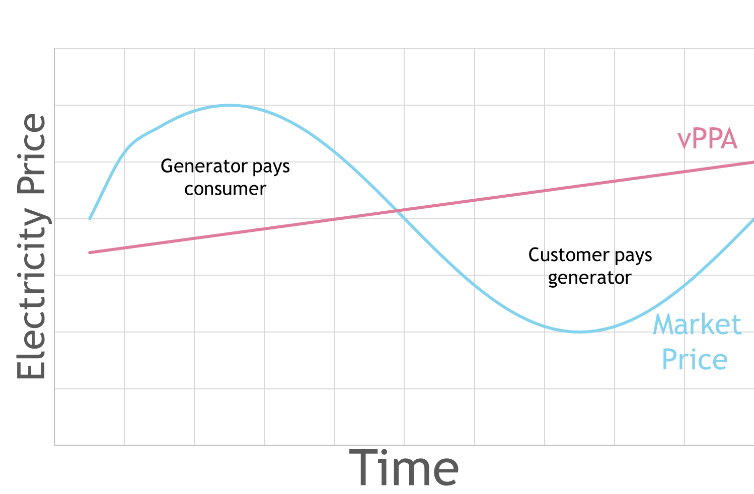
Project Summary
The Hub worked alongside Plymouth City Council (PCC) and Plymouth Energy Community (PEC) to agree an innovative Virtual Power Purchase Agreement (VPPA) for electricity generated by a new solar farm to be built by PEC.
The agreement will help to provide guaranteed income for the solar farm and make finance easier. It will also provide electricity price stability for PCC, as well as access to new low-carbon electricity, subject to final business case and sign-off.
Background
The project was initially part-funded through the feasibility stages by the Rural Community Energy Fund, having received around £140,000 to support key areas of work, including planning, securing the land, and negotiating the Heads of Terms for the Power Purchase Agreement (PPA).
The 14MW solar farm will be built and operated through a Joint Venture between PCC and PEC on an ex-landfill site.
The solar farm plays a key role in Plymouth’s response to the Climate Emergency and will make a substantial contribution to the city’s ambition to get to carbon neutral emissions.
In 2022, PEC and PCC approached the Hub with the project and asked for support to establish the terms for the VPPA. The Hub had previous experience working on innovation and implementation models for community renewables and local authorities, and was well positioned to provide this kind of support.
Due to the innovative nature of VPPA’s in the public sector, the Hub facilitated support through Ernst & Young to help the council and PEC understand the risks and opportunities of this approach, and to secure confidence over the appropriate Power Purchase Agreement (PPA) price that the renewable energy could be sold for.
PCC were also keen to explore the VPPA as a means of securing long term access to local, low carbon electricity and as a hedge against the risk of future volatility in the wholesale electricity market.
PCC and PEC agreed to work together on an open book basis to agree a strike price for the VPPA and to use the expert services of the consultancy procured by the Hub to help them understand the electricity market, the specifics of the operation of VPPAs compared to Sleeved PPAs, and to analyse the benefits of adopting a VPPA compared to the council’s current method of procuring electricity.
Our Role
The Hub was able to provide £50,000 of funding to procure the services of Ernst and Young – an expert consultancy in the field of VPPAs. The Hub project managed the delivery of the consultancy, ensuring that the needs of the clients were met.
Location
The solar farm will be located on an old landfill site to the east of Plymouth and covers approximately 17.8 hectares.
Technology
The solar farm will comprise solar photovoltaic (PV) panels.
Financing and Ownership
The solar farm will be built by a joint venture between PEC and PCC and will be partially funded by a community bond or share offer managed by PEC Renewables.
A key part of the project finances will be the proposed VPPA, which will provide a long-term price guarantee and income for the solar farm, whilst providing price stability for the council’s electricity bills.
The solar farm output would correspond to more than 50% of PCC’s annual electricity requirement and contribute to the council’s journey towards reducing fossil fuel emissions.
A VPPA is a commercial contract between the generator and consumer, that is used to manage the risks of electricity price volatility both for the generator and consumer. It is ‘virtual’ because the electricity itself is sold and bought separately through independent contracts.
The generator and consumer share risk either side of an agreed ‘strike price’ for power. If wholesale energy prices go above this rate, the generator pays the consumer the surplus revenue, if the price goes below this rate, the consumer tops up the market price to meet the strike price.
Results
The project looked at three possible strike prices related to the different possible costs of building the solar farm. The work also considered two possible mechanisms for reconciling the value of the regular payments that would be due between the parties under the VPPA contract.
The project has allowed both parties to understand the operational and cost implications of agreeing a VPPA over the long term.
Council officers used this knowledge to put forward a business case to secure cabinet approval in principle for a VPPA between the council and the joint venture to build the solar farm. This approval will be followed with a final business case when the full costs and details of the project are known.
Benefits
- PCC can provide long-term secure income for a new local community-owned solar farm making a substantial contribution to Plymouth’s net zero ambitions
- PCC secures access to new low carbon electricity
- PCC has long term price certainty over its electricity bills
Next Steps
The final commercial terms will be agreed and the VPPA will be signed subject to final business case approval, once the detailed design and costing of the solar farm is complete.
Key Facts
| Client | Plymouth Energy Community and Plymouth City Council |
| Strategic priority | Innovative finance models for community renewables |
| Energy generation/saving | Circa 13GWh of renewable energy each year. |
| Timeline | • Planning permission secured June 2022 • Construction expected to complete in 2024 |
| Carbon saving | 3,330 tonnes of carbon saved each year |
| Project value | Approx. £16m |
| Find out more | Visit the Plymouth Energy Community website Synthetic PPA Toolkit for Local Authorities |


